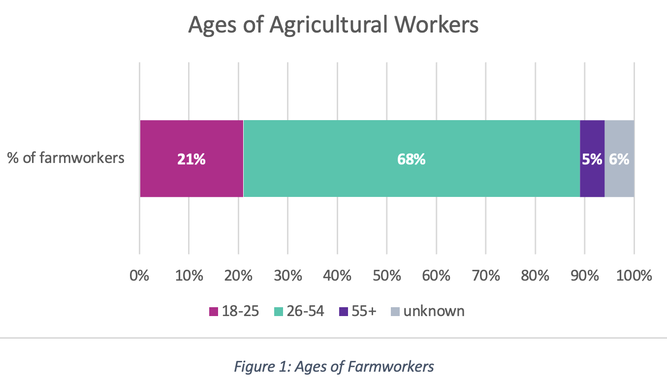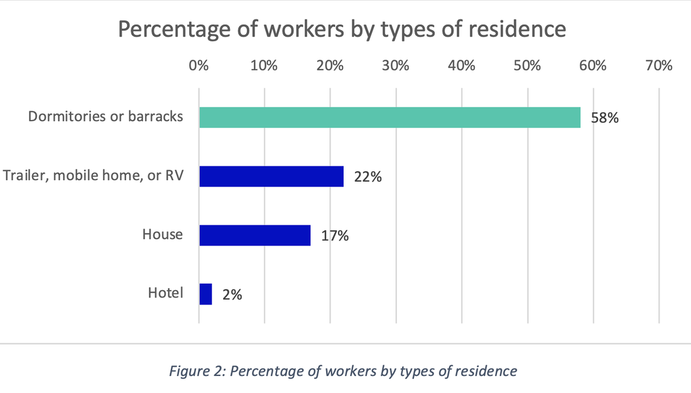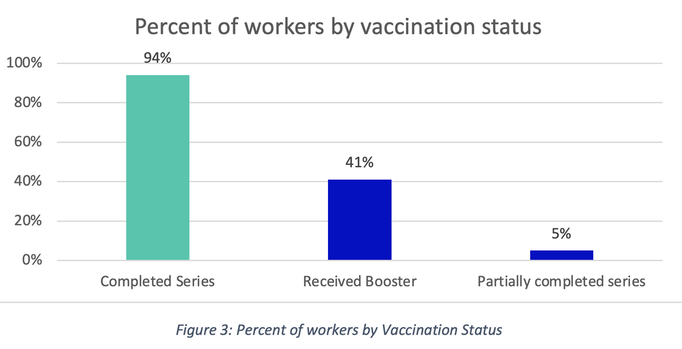COVID-19 and H-2A Guest Workers in the Southeastern U.S.
International guest worker experiences in Colquitt County, Georgia and Sampson County, North Carolina
Download the PDF version of this fact sheet.
BACKGROUND
International guest workers, primarily from Mexico, have become a critical subpopulation of the U.S. farm labor force. , Due to language barriers and a lack of support in navigating U.S. systems and culture, these workers often experience multiple vulnerabilities and barriers to accessing health care in the U.S. As part of a national COVID-19 outreach and vaccination project for farmworkers supported by the Centers for Disease Control and Prevention (CDC), NCFH has conducted a series of Farmworker COVID-19 Community Assessments (FCCA), which include oral surveys with farmworkers on randomly sampled housing, work, and community sites and in-depth interviews with workers, employers, and farmworker experts. This fact sheet provides a summary of key findings regarding the demographics of 339 H-2A workers interviewed in two FCCA communities (Colquitt County, Georgia and Sampson County, North Carolina), selected aspects of their experiences with COVID-19, and their self-reported uptake of COVID-19, influenza, and tetanus vaccinations. These two communities are highlighted in this fact sheet due to the high number of H-2A guest workers that arrive in the area every year.
DEMOGRAPHICS
- 97% of workers were male and 3% were female.
- 100% of workers were born in Mexico. The top states of origin from Mexico were San Luis Potosi (13%), Veracruz (11%), Nayarit (9%), Oaxaca (8%), and Michoacan (8%).
- 25% of workers reported their race as Indigenous or spoke a Mesoamerican Indigenous language.
- 82% of H-2A workers spoke only Spanish and 18% spoke a Mesoamerican language in addition to Spanish. The top Mesoamerican languages spoken were Zapotec (3%), Nahuatl (2%), and Tsotsil (2%).
- 21% of workers were between 18-25 years old, 68% were between 26-54 years old, and 5% were 55 years of age or older. Six percent of workers did not provide their age. See Figure 1 below.
EMPLOYER-PROVIDED HOUSING AND TRANSPORTATION IN THE U.S.
- 58% of workers resided in dormitories or barracks, 22% in a trailer, mobile home or RV, 17% in a house, and 2% in hotels. Two percent reported other forms of housing. See Figure 2 below.
- 92% resided in overcrowded housing, with more than one person per room in the housing unit. [1]
- 91% of workers commuted to work in labor buses or vans, potentially increasing their risk of exposure to respiratory diseases.
- Three percent rode to work with a ‘raitero’, which also usually involves adults from different households commuting together.
- Other forms of transportation were uncommon, such as walking or riding a bicycle to work (2%) or riding in a personal vehicle with a relative or coworker (1%).
COVID-19 SAFETY PRECAUTIONS AND TESTING
COVID-19 AND OTHER VACCINATIONS
- 33% of workers did not receive a comprehensive COVID-19 training [2] in their preferred language at work.
- 78% of workers reported that their employer regularly provided face masks at work.
- 45% had taken a COVID-19 test at least once in the past 12 months.
- More than one in five (22%) workers knew or thought they had COVID-19 at least once.
- 57% of those who had or thought they had COVID-19 were able to isolate from other household members.
- 33% of workers who had or thought they had COVID-19 continued working while exposed or ill.
COVID-19 AND OTHER VACCINATIONS
- 94% of workers had completed their primary series of COVID-19 vaccinations. [3]
- 41% of workers had also received a booster vaccination for COVID-19.
- 5% of workers had partially completed their primary series and 1% of workers were unvaccinated against COVID-19.
- 35% of workers reported that they had received an influenza vaccine in the past 12 months.
- 61% of workers reported that they had been vaccinated against tetanus, diphtheria, and pertussis in the past 10 years.
- 73% of workers reported that they had been vaccinated against measles, mumps and rubella in their lifetime.
1. U.S. Census Bureau. Historical Census of Housing Tables: Crowding. Accessed September 12, 2022. https://www.census.gov/data/tables/time-series/dec/coh-crowding.html
2. A comprehensive COVID-19 training was defined as a training that included information about how to use face masks, hand-washing, how to isolate if sick or exposed to COVID-19, and physical distancing.
3. As international travelers, H-2A guest workers are required to complete the primary series of an FDA- or World Health Organization-approved COVID-19 vaccine at least 2 weeks before entering the U.S. Source: Centers for Disease Control and Prevention. (2022). International travel to and from the United States. Retrieved from https://www.cdc.gov/coronavirus/2019-ncov/travelers/international-travel-during-covid19.html



